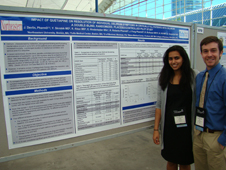Young scholars showcase work to science society

Northeastern University student-researchers Shubha Bhat and Eric Hinderleider exhibited an unusual level of composure during their poster presentation on delirium and sedation for some 6,000 therapists, pharmacists and physicians at the Society of Critical Care Medicine’s annual Critical Care Congress.
Bhat and Hinderleider conducted three studies on delirium in critically ill patients; they were the only students to attend the conference, held in San Diego in January. Their research was performed under the direction of John Devlin, an associate professor of pharmacy practice. The Society of Critical Care Medicine is an international scientific association of intensive care professionals.
The students praised the university for the chance to showcase their work. “The great thing about Northeastern is that it offers students a lot of opportunities,” said Bhat, a fifth-year student in the doctor of pharmacy program. She received an undergraduate student-research award from the Office of the Provost and funding from the Office of the Dean in the School of Pharmacy to attend the meeting.
“This experience drives me to accomplish even more,” Bhat added, noting her plans to do a residency at a hospital after she graduates next year.
“It was cool to network with physicians, nurses and residents and to have an opportunity to check out new technology in the field,” said Hinderleider, a graduate student in the doctor of pharmacy program who plans to do a residency at one of the hospitals affiliated with the University of California-San Francisco School of Medicine after he graduates in 2012.
“It was great to have the opportunity to immerse myself in that professional environment,” he said.
All three of Bhat and Hinderleider’s research posters are expected to be published in critical-care journals, said Devlin.
One study, a secondary analysis of a randomized-controlled study that recently appeared in Critical Care Medicine, analyzed the antipsychotic drug quetiapiane’s ability to alleviate individual symptoms of delirium. The second study measured whether a national shortage of propofol, a widely-used sedative in the ICU, has impacted the length of time patients spent on a ventilator. A third study explored the ways that critical-care pharmacists recognize and treat delirium.
Devlin said that students appreciate research after they’ve experienced the process of developing an idea, collecting data, writing an abstract and presenting the results.
“It really hits students hard when they come to these big meetings and find out that intensive care unit clinicians are so interested in the research they did,” said Devlin, who praised Bhat and Hinderleider’s composure while interacting with some of the world’s top critical-care physicians. “They say, ‘I can’t believe how important my research is.’”